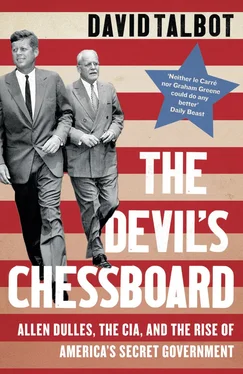Braun was mad for crocodile shoes and accessories. “ She loved crocodile in every shape and form, and returned to her hotel looking as if she had come back from a trip up the Congo rather than along the Tiber.”
Dollmann was fond of Braun, a sweet and simple young woman who confided her sad life to him. She was known throughout the world as the German strongman’s mistress, but, as she confessed to Dollmann, there was no sexual intimacy between her and the Führer. “He is a saint,” Braun told Dollmann wistfully. “The idea of physical contact would be for him to defile his mission. Many times we sit and watch the sun come up after spending the whole night talking. He says to me that his only love is Germany and to forget it, even for a moment, would shatter the mystical forces of his mission.”
Dollmann strongly suspected that the Führer had other passions besides Germany. On Christmas Eve 1923, when he was a university student in Munich, Dollmann had been invited to an extravagant, candlelit party at the home of General Otto von Lossow, who had helped put down Hitler’s Beer Hall putsch in November 1923. During the evening, Lossow took Dollmann and some of his other guests into his parlor, where he entertained them by reading selections from Hitler’sthick police dossier. “In a café near the university on the evening of, Herr Hitler was observed …” Lossow’s voice was matter-of-fact as he read through the depositions and eyewitness reports about Germany’s future leader. The general’s small audience listened in rapt silence, transfixed by the portrait of a Hitler who was more interested in boyish men than in national politics.
These were the sorts of tales that Dollmann kept tucked away—stories that would help the consummate survivor navigate what he called the “witches’ cauldron” of Rome as well as Berlin’s dark labyrinth. As the Nazis’ main fixer in Rome, it helped to know everything he could about the dangerous men with whom he was dealing.
The Nazi official Dollmann most dreaded escorting around Italy was Reinhard Heydrich, Himmler’s top executioner. “Now there was a man clearly meant to be murdered by someone or other,” Dollmann observed years later. “He was a daemonic personality, a Lucifer with cold blue eyes.” One night, Heydrich demanded that Dollmann takehim to Naples’s finest brothel. Two dozen half-naked women representing the full spectrum of the female form—from “slim gazelles to buxom Rubenesque beauties”—were arranged for Heydrich’s inspection in the brothel’s ornate lobby, with its gilt-edged mirrors and frescoes of rosy nymphs. Heydrich gazed at the women on display with his blank, shark eyes. Considering the SS butcher’s reputation, Dollmann did not know what to expect next. Suddenly Heydrich flung a fistful of shiny gold coins across the marble floor. “Then he jumped up, Lucifer personified, and clapped his hands. With a sweeping gesture, he invited the girls to pick up the gold. A Walpurgisnacht orgy ensued. Fat and thin, ponderous and agile, the [women] scrambled madly across the salotto floor on all fours.”
Afterward, Heydrich looked pale and spent, as if he himself had joined in the frenzy. He coolly thanked Dollmann and disappeared into the night. The interpreter was glad to see Heydrich go. He was, said Dollmann, “the only man I instinctively feared.”
History has come to judge Eugen Dollmann as “ a self-serving opportunistwho prostituted himself to fascism,” in the words of legal scholar Michael Salter, but not a fanatic like the men he served. Nevertheless, as war criminal proceedings got under way in Nuremberg in the fall of 1945, Dollmann knew that he was at high risk of prosecution. The Nuremberg trials, where Foreign Minister Joachim von Ribbentrop and Ambassador Franz von Papen were both convicted, firmly established that diplomats like Dollmann who moved in rarefied Nazi circles were not immune from judicial reckoning.
Dollmann was perhaps at even greater risk in Italy, where passions ran high regarding Nazi massacres of Italian civilians, such as the infamous slaughter of 335 prisoners in the Ardeatine Caves near Rome in March 1944. Although Roberto Rossellini modeled the effeminate, sadistic SS captain Bergmann on Dollmann in his postwar film Rome, Open City , Dollmann was not directly involved in the Ardeatine atrocity; in reality, the colonel had no taste for brutality. After the war, Dollmann claimed that he had once even rescued several Italian partisans who were being burned alive by fascist thugs. Regardless of his degree of guilt or innocence, however, Dollmann was the most visible symbol of the Nazi occupation of Rome. Italians were all too familiar with the numerous newspaper photos of his slim, ben vestito figure taken at social events in Mussolini’s Palazzo Quirinale or the Vatican. In the fall of 1945, as he strolled around Rome with his fake ID card, Dollmann was acutely aware that if he fell into the wrong hands—particularly those of Italian Communists—he could be lynched.
Dollmann’s anxieties were heightened when American agents installed two former SS colleagues in his Rome apartment—including the notorious Colonel Walter Rauff, who had served as Karl Wolff’s second-in-command in northern Italy—because he knew that the hideout might now attract increased interest from Nazi hunters. Dollmann, who regarded Rauff as “ one of my most disagreeable acquaintances,” was well aware of his new roommate’s past. In 1941, Rauff had overseen the development and operation of a fleet of “Black Raven” vans, in which victims were sealed inside and asphyxiated with exhaust fumes. As many as 250,000 people on the war’s eastern front were murdered in Rauff’svehicles, which were eventually replaced by the gas chambers of Auschwitz and Dachau. “In my opinion,” Dollmann mordantly remarked, “he was quite certainly due for the high jump [at Nuremberg] when they got round to him.” But Rauff had managed to save his neck by prudently jumping on board the Operation Sunrise bandwagon with Wolff.
Weary of his roommate’s baleful presence, Dollmann often fled the Via Archimede apartment to go to the movies. As he sat in the dark day after day, he began getting the prickling sensation that he was being followed. One afternoon in November 1946, as the colonel watched a trifle titled Kisses You Dream Of ??at his neighborhood cinema, Dollmann felt a firm handon his shoulder and heard a voice of authority: “Kindly leave the cinema with me.” He was taken into custody by a plainclothes detective who was accompanied by two armed carabinieri and then whisked away to a nearby police station.
Dollmann and his fellow SS escapees had been tracked for months by the 428th U.S. Army Counterintelligence Corps (CIC), a detachment of Nazi hunters based in Rome. Major Leo Pagnotta, the Italian American who was second-in-command of the CIC unit, was a sharp investigator. He figured out that Dollmann, who knew it was unwise to show his face too much on the streets, would sooner or later reconnect with the Italian chauffeur who had driven him around during his SS days. Dollmann did indeed contact the chauffeur, but Pagnotta had gotten to him first, making him an offer he couldn’t refuse. “If you see Dollmann and you don’t tell me,” Pagnotta had told the driver, “I’ll arrest you and you’ll be shot.” The chauffeur quickly gave up Dollmann, pinpointing when and where he would be dropped off at the cinema.
Now, as Dollmann sat waiting in the police station holding room, the door suddenly opened and Major Pagnotta walked in. The two men took an immediate dislike to each other. Dollmann was predisposed to look down on Americans, whom he found in general to be a crass, illiterate, and mongrelized people. To make matters worse, this one was “rather fat”—a cardinal sin with Dollmann—and the American didn’t bother with any social niceties, treating the Nazi fugitive like “a pretty low sort of criminal.”
Читать дальше











